Story and Photos By Katelin Everson, JD/MBA student and research assistant to Prof. Richard Stacey
On September 22-23, 2017, the University of Toronto Faculty of Law hosted a symposium on the ‘Limits and Legitimacy of Referenda’. Co-convenors Richard Stacey (University of Toronto Faculty of Law) and Richard Albert (Boston College Law School) brought together scholars from around the world for discussion and exchange on the role and efficacy of referenda in amending and making constitutions, in resolving territorial disputes, and in questions of national identity.
A theme that emerged as central to the conversation was a dilemma revolving around the conflicting ethical implications of referendum. On one hand, the referendum stands as an important tool of democracy, upholding the moral commitment to government according to the will of the people, and recognising the moral autonomy of people to decide how they want to be governed. In this sense a moral commitment to democracy presupposes people’s capacity to form and express opinions, as well as guaranteeing the equal liberty of all to do so. But on the other hand, the referendum may operationalize populist and nationalist rhetoric that emphasises homogeneity and unity, and threatens to undermine a society’s moral commitments to values of liberty, equality, multiculturalism and diversity. The referendum thus emerges not as a way of accommodating or celebrating difference but of eliminating it, squarely juxtaposing the moral reasons to value referendum against the moral reasons to avoid it.
The programme was generously supported by the Faculty of Arts and Sciences, the Faculty of Law, the Centre for Ethics at the University of Toronto, and the Munk School of Global Affairs.
The topic of the first panel of the symposium was ‘Constitutional Theory’, and Richard Albert kicked off with a paper entitled ‘Discretionary Referenda in Constitutional Amendment, with David Dyzenhaus (University Professor, University of Toronto) serving as discussant. Albert’s paper focuses on referenda on constitutional amendments, in cases where a referendum is not constitutionally obligatory or required by the amendment procedures set out in the constitution. Albert draws on the experience of these non-obligatory or discretionary referenda around the world – Canada, Columbia, France and the United Kingdom – to develop a typology of discretionary referenda in constitutional amendment. The paper then considers why constitutional actors deploy discretionary referenda and situates recourse to them against the backdrop of an increasingly observable phenomenon in constitutional democracies: the circumvention of the recognized rules of constitutional change. Albert identifies several reasons why referenda are deployed, including to circumvent onerous constitutional amendment thresholds, to overcome political resistance, and to give constitutional actors political cover for important or controversial choices.
The second paper on constitutional theory was presented by Richard Stacey, with Jamie Cameron (Osgoode Hall Law School) as discussant. In ‘The Unnecessary Referendum: Popular Sovereignty in the Constitutional Interregnum’, Stacey challenges claims that during a ‘constitutional interregnum’ where the old constitutional order is abrogated and all previous markers of the people’s sovereign will are dissolved, a referendum is necessary and sufficient to infuse a new constitutional order with the authority of popular sovereignty. Stacey argues instead that the claim to popular sovereignty implies no more than a substantive commitment to the principles of individual moral autonomy and political equality that make a referendum possible in the first place, and that the referendum itself is accordingly never necessary for a constitution to make a meaningful claim to popular sovereignty. Stacey admits that a referendum may be necessary to deliver legitimacy to a new constitutional order, but draws a distinction between popular support – or legitimacy – and popular sovereignty, warning against collapsing popular sovereignty into a substantively impoverished conception of legitimacy. Rejecting the sufficiency argument, Stacey concludes that we should be alive to the possibility that a constitutional referendum may serve only to bring a veneer of legitimacy to abusive or illiberal constitutional arrangements that are antithetical to the very idea of popular sovereignty.
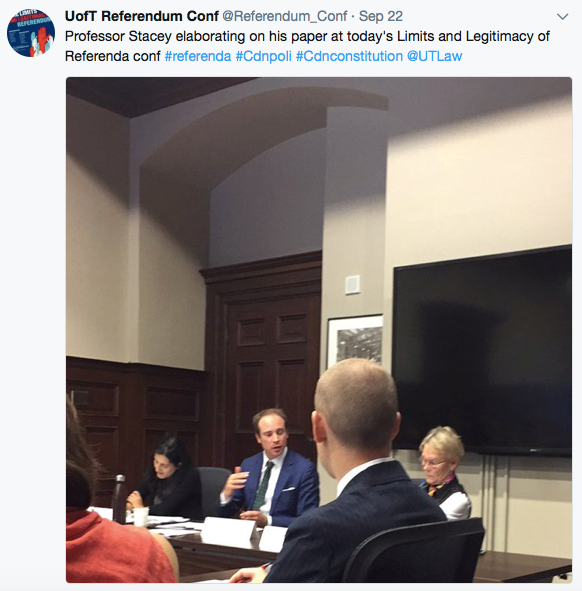
Beginning the second panel of the symposium, ‘Divided Societies’, Stephen Tierney (Edinburgh Law School) presented his paper on ‘Referendums in Federal States: Territorial pluralism and the challenge of direct democracy’. David Schneiderman (University of Toronto, Faculty of Law) acted as discussant. Tierney’s paper focuses on the use of referenda in federal systems, considering the democratic critique of referenda in general and the ways in which the referendum challenges how we think about the legitimacy of change in constitutional settings. The paper explores how the dramatic intervention of ‘the people’ in constitutional change upsets general understandings of the balance between change and stability in mainstream constitutional theory, and how direct democracy poses a particular test for federal constitutional theory as it is itself predicated upon a conceptual pluralisation of ‘the people’ for constitutional purposes. Referenda pose key problems in federal states by positing the entire people as one group, when the federal constitution has in fact been crafted to facilitate complex and pluralised models of decision-making that reflect the territorial pluralism of the polity. The paper concludes by noting that the tensions exposed in the relationship between federalism and the referendum serve as an example of how federalism, more generally, requires renewed attention from detailed, systematic and rigorous constitutional theory.
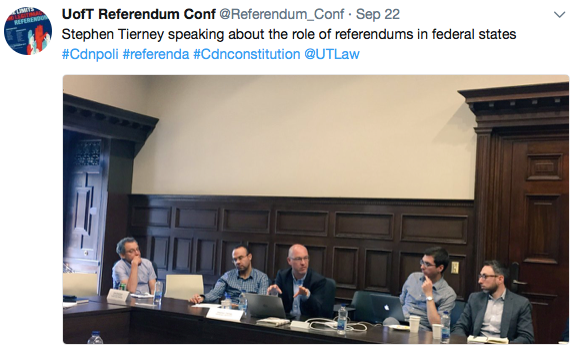
Antoni Abat i Ninet (University of Copenhagen) asked the group ‘Do you want Catalonia to be an independent state in the form of a republic?’, with Jacques Bertrand (University of Toronto, Department of Political Science) as discussant. Ninet’s paper analyses the referendum as a democratic instrument and assesses its suitability in settling territorial disputes involving national minorities. Timeously using the Catalan referendum on independence as a backdrop, Ninet develops a theory of democratic self-determination in which referendum plays a central role. He defends this position against the approach to referendum that the European Commission for Democracy through Law (Venice Commission) takes, and against responses to criticisms of referendum in the wake of 2016’s Brexit referendum, the Italian constitutional referendum, and Colombia’s referendum on the FARC peace agreement. The paper then returns to the Catalonia-Spain dispute in more detail, analysing the Spanish arguments to prevent the vote and the Catalan arguments in support of the plebiscite in light of Abat’s theory of self determination.
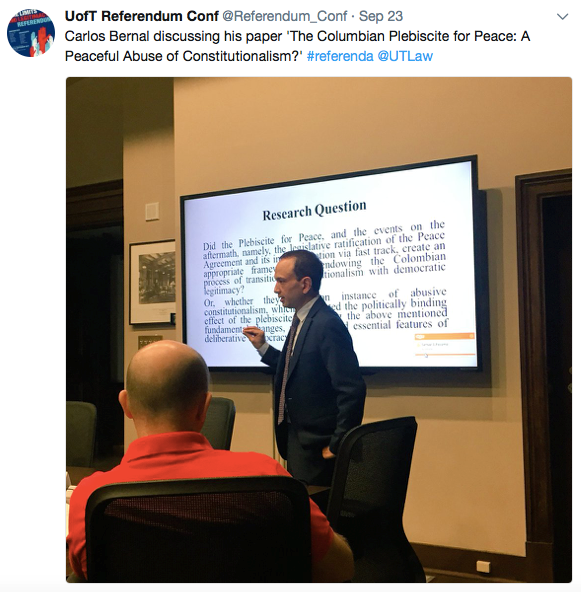
Carlos Bernal (Constitutional Court of Colombia) presented the fifth paper, ‘The Colombian Plebiscite for Peace: A Peaceful Abuse of Constitutionalism?' with Yasmin Dawood (University of Toronto Faculty of Law and Department of Political Studies) as discussant. Bernal’s paper focuses on the October 2016 Columbian Plebiscite for Peace, in which the Columbian government sought public support for the peace agreement it had reached with the Revolutionary Armed Forces of Columbia (FARC). A majority of the people voting in the referendum rejected the agreement, and although the government amended the agreement following the referendum it proceeded to ratify the new agreement without a second plebiscite. Bernal asks whether ratification of the agreement and its implementation via a fast track Congressional approval process constituted an abuse of democratic constitutionalism, or a lesson on how to defend higher constitutional goals from the risk of random victories by slim majorities in plebiscites. He argues that Constitutional Court of Columbia found a balanced way to manage this tension by validating the congressional ratification of the amended agreement, while at the same time striking down central features of the fast track procedures for imposing unconstitutional limits to deliberative democracy and political rights, and violating separation of powers principles by centralising power in the presidency. Bernal concludes by noting both the value and the danger that plebiscites hold for transitional constitutionalism.
The final panel of the symposium dealt with ‘Public Participation’, and began with Janna Promislow’s paper (Thompson Rivers University, Faculty of Law), ‘Deciding on the Future: Land Claim Agreement and Ratification Votes in First Nations’. Courtney Jung (University of Toronto Department of Political Science) served as discussant. The paper focuses on processes by which modern comprehensive land claims agreements – or modern treaties – are ratified in Canada’s First Nations communities. The paper notes how both the provisions and legacy of the Indian Act and difficulties endemic to modern ratification processes complicate notions of democracy and majoritarian politics in Indigenous contexts. The paper describes challenges involved in identifying the appropriate polity for negotiations, the silencing of dissent, constraints on community decision-making arising from negotiations loans and financial incentives, and the fact that representative decision-making bodies are frequently constituted specifically for the purposes of approving a modern treaty. Taken together, Promislow argues that the processes by which Canada’s modern treaties are ratified fails to take Indigenous conceptions of sovereignty and self-determination seriously.
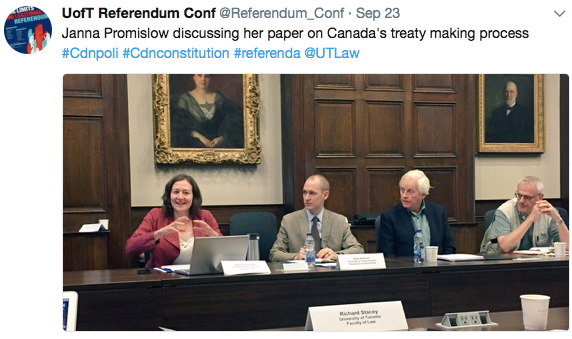
In the final paper, Zachary Elkins and Alex Hudson (University of Texas at Austin, Department of Government) engaged discussant Ran Hirschl (University of Toronto, Faculty of Law and Department of Politics) on their paper ‘When do Constitutional Referenda Fail?’ Elkins and Hudson aggregate a historical dataset of constitutional referendum statistics, covering a total of 644 constitutional referenda between 1793 and 2016. Elkins and Hudson distinguish between referenda that seek to ratify a new constitution and those that seek to amend existing constitutions. Using the dataset, the authors analyse the conditions under which referenda are more likely to succeed or fail. They investigate the relationship between the success of a referendum and a number of variables, including whether a referendum occurs alongside another election, mandatory versus voluntary referenda, turnout, and regime type. Elkins and Hudson find that there is a reasonable chance (39%) that a proposed constitutional amendment will be turned down by the voters, but that this very rarely happens in votes in referenda on completely new constitutions (6%). The paper’s compelling finding – and one emphasized by Professor Hirschl as making a significant contribution to the literature – is that referenda on new constitutions tend to fail only when the person or power proposing the new constitution had no option but to hold a referendum on the new constitution.
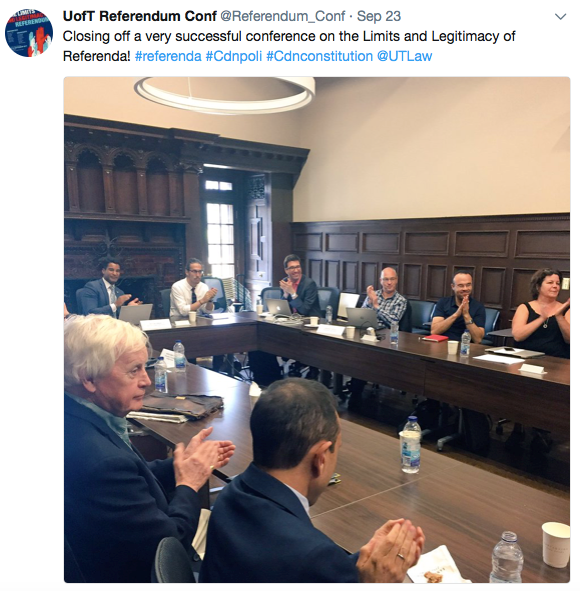
The papers are currently under revision for publication. Check back here for further updates.





